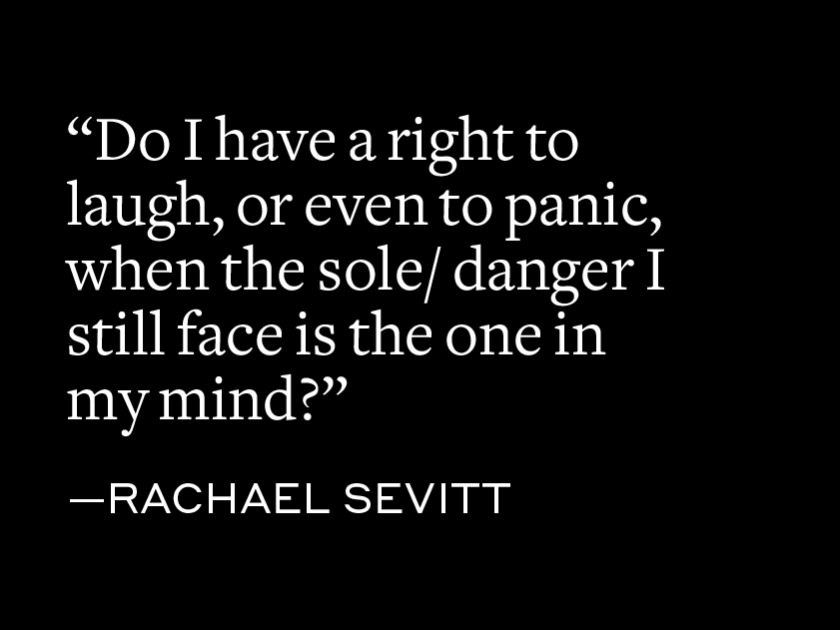
This piece is part of our Witnessing series, which shares pieces from Israeli authors and authors in Israel, as well as the experiences of Jewish writers around the globe in the aftermath of October 7th.
It is critical to understand history not just through the books that will be written later, but also through the first-hand testimonies and real-time accounting of events as they occur. At Jewish Book Council, we understand the value of these written testimonials and of sharing these individual experiences. It’s more important now than ever to give space to these voices and narratives.
Yesterday in the car I said I feel like a failure.
Almost a year watching the war and I’m exhausted. As if it is just a rainy
day and not a 9 month long nightmare, I spend my nights curled up like a baby
in front of the TV with a hot drink, protecting my soul
and pretending the violence is happening somewhere far away.
In a way it is. If I was closer to the war I wouldn’t have been laughing
by the time we got home from the self-effacing car ride. I’m good at laughing
twenty minutes after crying. Rather, my boyfriend is good at making my pity sessions fail.
At the start of it all he’d tell me don’t let the terrorists win! Imagine you’re in a faraway
place, somewhere safe, dancing in the rain.
Do I have a right to laugh, or even to panic, when the sole
danger I still face is the one in my mind? Compared to a baby
in a raided Kibbutz, or a trapped baby in Gaza, or to the baby
hostage who has spent longer a hostage than free, my laughter
feels offensive. I’m doubtful if civilians in Gaza have time to be happy. If panic is the sole
feeling you have for a year, you will just die. Like Yossi Jan, whose heart failed
a day before his hostage son Almog was rescued. I couldn’t understand how it wasn’t raining,
how the sun could dare to burn on that bittersweet morning. Though the war feels far away,
every time a soldier casualty is announced I still worry I’ll see a friend’s face. Far away
is a relative distance. Everything feels relative right now, apart from time. A baby
still gestates for 9 months. The weather in Israel is still absolute, too. It never rains
after Shavuot. Rarely does it rain until after Sukkot, though I remember laughing
and dancing in the October showers when the weather app failed
to predict the rain on Simchat Torah. It was like a wave from God to our silly souls
who always pray about rain but never expect it to come. My soul
is tired of prayer. It tired long before the war began. My days with God are a faraway
dream, clung to in a time of crisis until my brain wrote faith off as another failed
coping mechanism. Distraction still works. Instead of thinking about the nightmare of babies
that could have grown in violated bellies of 13 female hostages still in Gaza, I laughed
on the phone with a friend who lives abroad. At her house it was raining.
Even when I’m happy, there’s a corner of my mind where it’s always raining.
It floods over when I’m cut by a jagged thought or when I look at a poster of a trapped soul,
and I try my best to play as a cheerful civilian, part of a chorus of grateful, desperate laughter,
but tears of misplaced guilt and horror and pain are never far away.
The war is right here. A full term of violence. A breaching baby.
9 months on from that nightmare day and all I can think is we have failed.
The views and opinions expressed above are those of the author, based on their observations and experiences.
Support the work of Jewish Book Council and become a member today.
Rachael Sevitt is a Scottish-Israeli writer, poet, and editor. She is the recipient of the 2023 Andrea Moriah prize in Poetry, and an MA student in Creative Writing at Bar Ilan University. Rachael lives near Tel Aviv, Israel. Her work has been published or is forthcoming in SWWIM, Passengers Journal, Squawk Back, Write-Haus Magazine, and elsewhere. Find more of her work at rachaelsevitt.com and @rachael.sevitt on Instagram.